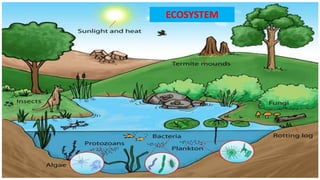
ecosystem open elective.pptx
- 1. ECOSYSTEM
- 2. Ancient Greek philosophers such as Hippocrates and Aristotle were among the first to record observations on natural history. Early conceptions of ecology, such as a balance and regulation in nature can be traced to Herodotus (died c. 425 BC), who described one of the earliest accounts of mutualism in his observation of "natural dentistry". Basking Nile crocodiles, he noted, would open their mouths to give sandpipers safe access to pluck leeches out, giving nutrition to the sandpiper and oral hygiene for the crocodile. Aristotle was an early influence on the philosophical development of ecology. He and his student Theophrastus made extensive observations on plant and animal migrations, biogeography, physiology, and their behavior, giving an early analogue to the modern concept of an ecological niche. Ecological concepts such as food chains, population regulation, and productivity were first developed in the 1700s, through the published works of microscopist Antonie van Leeuwenhoek (1632–1723) and botanist Richard Bradley (1688?–1732). Biogeographer Alexander von Humboldt (1769–1859) was an early pioneer in ecological thinking and was among the first to recognize ecological gradients, where species are replaced or altered in form along environmental gradients, such as a cline forming along a rise in elevation. Humboldt drew inspiration from Isaac Newton, as he developed a form of "terrestrial physics". In Newtonian fashion, he brought a scientific exactitude for measurement into natural history and even alluded to concepts that are the foundation of a modern ecological law on species-to-area relationships. Natural historians, such as Humboldt, James Hutton, and Jean-Baptiste Lamarck (among others) laid the foundations of the modern ecological sciences. The term "ecology" (German: Oekologie, Ökologie) was coined by Ernst Haeckel in his book Generelle Morphologie der Organismen (1866).Haeckel was a zoologist, artist, writer, and later in life a professor of comparative anatomy.
- 3. Some mark Haeckel's definition as the beginning;[238] others say it was Eugenius Warming with the writing of Oecology of Plants: An Introduction to the Study of Plant Communities (1895),[239] or Carl Linnaeus' principles on the economy of nature that matured in the early 18th century. Linnaeus founded an early branch of ecology that he called the economy of nature. His works influenced Charles Darwin, who adopted Linnaeus' phrase on the economy or polity of nature in The Origin of Species. Linnaeus was the first to frame the balance of nature as a testable hypothesis. Haeckel, who admired Darwin's work, defined ecology in reference to the economy of nature, which has led some to question whether ecology and the economy of nature are synonymous. The layout of the first ecological experiment, carried out in a grass garden at Woburn Abbey in 1816, was noted by Charles Darwin in The Origin of Species. The experiment studied the performance of different mixtures of species planted in different kinds of soils. Prior to The Origin of Species, there was little appreciation or understanding of the dynamic and reciprocal relations between organisms, their adaptations, and the environment. An exception is the 1789 publication Natural History of Selborne by Gilbert White (1720–1793), considered by some to be one of the earliest texts on ecology. While Charles Darwin is mainly noted for his treatise on evolution, he was one of the founders of soil ecology, and he made note of the first ecological experiment in The Origin of Species. Evolutionary theory changed the way that researchers approached the ecological sciences. Since 1900
- 4. ecology from non-English-speaking cultures is hampered by language and translation barriers.[256] This whole chain of poisoning, then, seems to rest on a base of minute plants which must have been the original concentrators. But what of the opposite end of the food chain—the human being who, in probable ignorance of all this sequence of events, has rigged his fishing tackle, caught a string of fish from the waters of Clear Lake, and taken them home to fry for his supper? Rachel Carson (1962)[258]:48 Ecology surged in popular and scientific interest during the 1960–1970s environmental movement. There are strong historical and scientific ties between ecology, environmental management, and protection.[235] The historical emphasis and poetic naturalistic writings advocating the protection of wild places by notable ecologists in the history of conservation biology, such as Aldo Leopold and Arthur Tansley, have been seen as far removed from urban centres where, it is claimed, the concentration of pollution and environmental degradation is located.[235][259] Palamar (2008)[259] notes an overshadowing by mainstream environmentalism of pioneering women in the early 1900s who fought for urban health ecology (then called euthenics)[248] and brought about changes in environmental legislation. Women such as Ellen Swallow Richards and Julia Lathrop, among others, were precursors to the more popularized environmental movements after the 1950s. In 1962, marine biologist and ecologist Rachel Carson's book Silent Spring helped to mobilize the environmental movement by alerting the public to toxic pesticides, such as DDT, bioaccumulating in the environment. Carson used ecological science to link the release of environmental toxins to human and ecosystem health. Since then, ecologists have worked to bridge their understanding of the degradation of the planet's ecosystems with environmental politics, law, restoration, and natural resources management.[22][235
- 5. The term `eco' refers to a part of the world and `system' refers to the co-ordinating units. An ecosystem (or ecological system) consists of all the organisms (biotic) and the physical environment (abiotic) which interact with each other.
- 15. Ecosystems are controlled by external and internal factors. External Factors
- 16. Internal Factors
